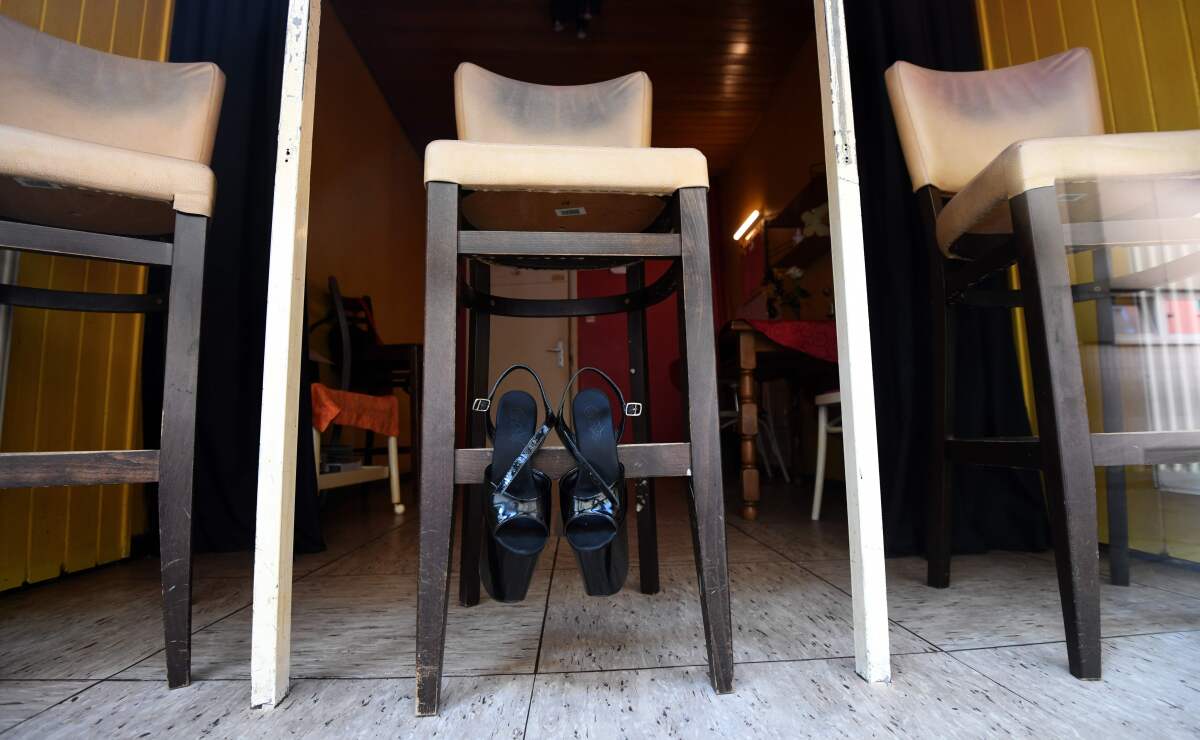Coronavirus forces adjustments for sex workers in Germany, where prostitution is legal

- Share via
BERLIN — Some German brothels closed with hardly any warning. Sex workers who had been fully employed suddenly feared homelessness. Many sought ways to keep working, at home or on the streets.
The coronavirus-induced changes to prostitution in Germany, where sex work has long been legal, in recent days has left many in the business with as many troubles and fears as anyone, scrambling to find a way to adjust.
“It’s impossible to know now what the long-term economic impact of this crisis will be — and harder to predict what the impact will be for us,” said Undine de Riviere, a sex worker in Germany for the last 25 years. “What we offer is a luxury article, not a daily need. This could be the first thing people cut back on.”
The nation saw Chancellor Angela Merkel solemnly announce last week that all brothels had to close to help prevent the spread of the coronavirus, the same order issued for bars, clubs, betting parlors, opera houses, museums and theaters. To bolster Europe’s largest economy, the government pledged $55 billion to support 5 million independent workers — including tens of thousands of sex workers — as part of its overall promise to inject $750 billion in aid to companies and industries.
The government in 2002 had improved the rights of sex workers by taking 1927 laws legalizing prostitution even further, allowing workers to advertise and enter formal contracts. Health insurance and pensions were also obtainable. That helped Germany become an even more popular destination for sex workers and customers from around the world. It has since become an $18 billion per year industry, according to the Verdi service sector union.
In addition to Germany, prostitution is legal in dozens of countries, including the U.S. (in parts of Nevada), as well as Mexico and Canada, with a wide range of regulations. There are an estimated 40 to 42 million prostitutes worldwide, according to a 2012 Business Insider report that cited a 2010 survey by the Fondation Scelles of France.
Prostitution is openly embraced by the government and society in Germany, where local municipalities collect hundreds of millions of euros in taxes every year.
“They come from Romania, Bulgaria, as well as Ukraine, Poland, Thailand and South America,” said Susanne Bleier Wilp of the Assn. for Erotic and Sexual Services Providers industry lobby group in Berlin. “But there are also sex workers and clients from the United Kingdom and the United States. The whole world is active in Germany.”
As essential as the government bailout will be for many, Bleier Wilp said about 80% of the sex workers are foreigners only temporarily in Germany — and are unlikely to see any rescue funds.
“The coronavirus crisis is hitting the poorest of the poor the hardest,” she said in a phone interview. “Their income dried up. They don’t have a permanent address and they don’t have health insurance. It’s a dire situation.”
While some brothels forced to close sent their sex workers packing, others such as the Leierkasten in Munich decided to allow those unable to travel home because of the closings of many borders in the European Union to reside in the brothel. A few weeks ago there were 700 clients each weekend coming to the famous 40-year-old brothel as patrons of the women working its 45 rooms.
“Most of our women left when we closed but some had nowhere else to go,” said managing director Dennis Miller in a phone interview.
Fourteen women stranded in Munich were staying in their rooms at the Leierkasten without paying the usual $200-per day room rental fee.
“It was the only humane thing to do,” Miller said. “We have to stick together in tough times. We couldn’t just throw them out on the street.”
Miller said that while the sex workers, as independent contractors, wouldn’t get any financial support from Leierkasten during the shutdown, the 20-member full-time support staff at one of the country’s largest brothels would continue to receive their paychecks thanks to the government’s “short-hours” support program.
Many staff members were doing renovations, repairs, painting and cleaning the building during the unplanned interruption, he said.
“The mood is pretty good all in all except for some of the women are starting to worry that their money will run out,” Miller said. “We’re just sitting tight and waiting for this to pass.”
Bleier Wilp said other sex workers in shuttered brothels were in a precarious position because many health offices ordered brothels closed and vacated — which forced some into homelessness. “We’re trying to organize help,” she said.
She said the pandemic was especially causing stress for sex workers who do not have enough savings to cover their living costs for a while.
“Some just can’t afford to sit this out,” said Bleier Wilp, 52, who had 10 years’ experience as a sex worker before becoming a lobbyist 15 years ago. “The brothels are closed so they’re forced out on the streets. But it’s risky. Some customers are offering to pay a 50% bonus.”
Other sex workers are trying to adapt to the situation caused by the coronavirus by moving their services — like much of the rest of the world — online into the home office mode.
“Some are trying to sell adult content online and experimenting with webcamming,” said Bleier Wilp. “It may take a while for that to catch on.”
Sex workers in Germany have bounced back from crises that followed terrorist attacks as well as global financial turmoil. Some brothels turned to modern marketing tools such as offering rebates or discounts and other gimmicks to win back customers and keep their businesses going.
De Riviere, 46, who is independent and works out of her apartment in Hamburg, said she has enough savings to get her through a few months and stopped seeing clients several weeks ago.
“The news was getting scarier so I decided not to take any more appointments at the start of the month,” she said in a phone interview, referring to the growth in the numbers of people infected that had shot up to more than 39,500 confirmed cases in Germany with at least 222 deaths as of Thursday. “Business was already slow in February. I was getting worried about being infected so I stopped.”
Another sex worker, who asked to be identified only by her artistic name Madame Kali, said she does not want to start working out of her own apartment. She uses a rented studio for her dominatrix activities in the western city of Bielefeld to maintain a clear break between her work and private life.
“I don’t want any whips lying around at home,” she said.
“I was able to continue working up until a week ago so I’ll just take a break now for a month or two,” she said. “It’s frightening. A close neighbor has lung disease and I worry that I could unintentionally infect him.”
Madame Kali, who said she is older than 40, said she was surprised that some customers continue calling to book appointments.
“You would think pretty much everyone would have got the message but there are still some weirdos out there,” she said. “I usually ask them if they’ve been watching the news or if they’re just insane.”
Kirschbaum is a special correspondent.
More to Read
Sign up for Essential California
The most important California stories and recommendations in your inbox every morning.
You may occasionally receive promotional content from the Los Angeles Times.










